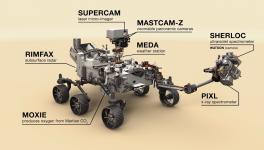Carbon Discovered in Mars by NASA Rover Sparks Curiosity About Presence of Life

Image Courtesy: Wikimedia
The Curiosity rover propelled by NASA landed on Mars on August 6, 2012. Since then, it has been roaming around the Gale Crater of the red planet, collecting samples and analysing them. Now, scientists have discovered a changed ratio of carbon isotopes in Martian samples collected from at least half a dozen locations, which has deepened interest in the presence of life on the planet. The carbon discovered may have its origin in ancient lives.
The new findings of the changed ratio of carbon isotopes in the planet and the possible explanations of its origin were reported by researchers in the PNAS (Proceedings of the National Academy of Sciences) on January 17. The researchers have come out with three plausible explanations for the findings. First is the cosmic dust, second is the ultraviolet degradation of carbon dioxide, and third, the carbon may have originated from ultraviolet degradation of biologically produced methane.
Scientists have found isotopes (same element in different forms) of carbon on Mars. Notably, carbon has two stable isotopes, carbon 12 and carbon 13. By analysing the amount of each of these isotopes in any substance, researchers can find out the specificities of the carbon cycle that have occurred, even from a very far past.
“The amounts of carbon 12 and carbon 13 in our solar system are the amounts that existed at the formation of the solar system. Both exist in everything, but because carbon 12 reacts more quickly than carbon 13, looking at the relative amounts of each in samples can reveal the carbon cycle,"—explained Christopher House, who is a professor of geosciences at Penn State University.
For about a decade now, the Curiosity rover has explored the Gale Crater and drilled into the surface, which consists of layers of ancient rocks. The drilling led the rover to collect samples from buried sedimentary layers. The samples were heated to an elevated temperature without oxygen to separate any chemicals present. Spectrographic analysis of the carbon obtained from this process showed the presence of isotopes 12 and 13 of carbon in some samples. The amount of the isotopes depended on when and where the original sample had been formed.
On the isotopes in the samples, Professor House again remarked—"The samples extremely depleted in carbon 13 are a little like samples from Australia taken from sediment that was 2.7 billion years old. Those samples were caused by biological activity when ancient microbial mats consumed methane. Still, we can't necessarily say that on Mars because it's a planet that may have formed out of different materials and processes than Earth."
As explanations of the isotopes, the researchers proposed the three possibilities mentioned at the beginning. House said that the solar system passes through a galactic molecular cloud every hundred million years.
The most exciting part is the possibility of the presence of life. If we consider Earth and try to explain the findings of Mars, then a depleted carbon 13 isotope on Earth would indicate past microbes had consumed methane produced microbially. Ancient Mars may have large plumes of methane that were released from the surface of the planet, where methane production was favourable. The methane released in this way may have been consumed by microbes present on the surface or reacted with ultraviolet light, which led to the direct deposition on the planet's surface. However, there is no direct evidence of surface microbes on the Mars landscapes, the researchers wrote in their report.
Get the latest reports & analysis with people's perspective on Protests, movements & deep analytical videos, discussions of the current affairs in your Telegram app. Subscribe to NewsClick's Telegram channel & get Real-Time updates on stories, as they get published on our website.
















